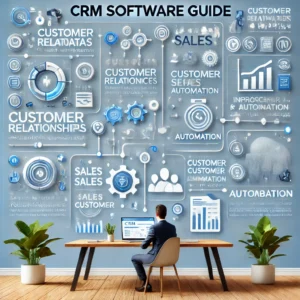- CRM software consolidates customer data, automates tasks, and offers valuable insights.
- Benefits: Better customer service, improved sales, and streamlined team collaboration.
- CRM types: Operational, Analytical, and Collaborative, each supporting unique business needs.
Customer Relationship Management (CRM) software has become indispensable for businesses of all sizes, facilitating efficient customer interactions, streamlined operations, and enhanced profitability. CRM software supports marketing, sales, and customer service teams in managing data, automating tasks, and improving customer experiences. In this guide, we explore CRM software’s pivotal role, types, features, and benefits, helping you choose the perfect CRM for your business needs.
What is CRM Software?
CRM software is a system designed to manage a company’s interactions with current and potential customers. It consolidates customer information, tracks interactions, automates sales processes, and provides valuable insights into customer behavior and preferences. Businesses benefit by delivering more personalized and timely services, thus strengthening customer relationships and enhancing loyalty.
Key Benefits of CRM Software
1. Enhanced Customer Service
CRM software centralizes customer data, allowing customer service teams to access complete profiles, purchase histories, and previous interactions. With comprehensive information, teams can provide faster, more accurate responses, fostering customer satisfaction and loyalty.
2. Improved Sales Performance
CRM software offers tools for managing leads, tracking sales processes, and monitoring pipeline activities. Sales automation features guide teams in nurturing leads, reducing manual tasks, and ensuring timely follow-ups, thereby increasing sales closure rates and revenue.
3. Data-Driven Decision-Making
CRM analytics provide actionable insights into customer behavior, marketing campaign performance, and sales trends. These insights allow businesses to make informed decisions that align with customer needs and preferences, enhancing operational efficiency and customer satisfaction.
4. Streamlined Internal Communication
A CRM system promotes collaboration by enabling information sharing across departments. By having a unified platform, marketing, sales, and customer service teams can seamlessly coordinate activities, ensuring a consistent customer experience and aligning efforts toward business objectives.
Types of CRM Software
CRM solutions vary based on features and functionality, catering to different business needs. Here’s an overview of the three main types:
1. Operational CRM
Operational CRMs focus on automating daily customer-facing operations, such as marketing campaigns, sales processes, and customer support activities. These CRMs streamline tasks, improve efficiency, and enhance customer interactions, making them ideal for businesses aiming to boost customer engagement.
2. Analytical CRM
Analytical CRMs specialize in data analysis, helping companies make data-driven decisions. By analyzing customer behavior, purchase patterns, and feedback, businesses can optimize marketing strategies, forecast demand, and deliver personalized experiences that resonate with their audience.
3. Collaborative CRM
Collaborative CRMs facilitate communication between departments and external stakeholders. They are perfect for businesses that need a unified system to manage partnerships, service interactions, and internal workflows, fostering cooperation across the organization for a cohesive customer experience.
Top Features to Look for in CRM Software
1. Contact Management
This feature allows businesses to store and manage customer contact information efficiently. With organized databases, teams can track every customer interaction, gain insights, and improve service delivery.
2. Sales Pipeline Management
Sales pipeline management tools provide real-time insights into the status of leads, opportunities, and sales progress. These tools streamline the sales process, allowing teams to prioritize tasks and focus on high-value prospects.
3. Automation Capabilities
CRM software often includes automation features that eliminate repetitive tasks. Automated workflows can handle email marketing, follow-up reminders, and sales reporting, freeing up time for teams to focus on strategic efforts.
4. Analytics and Reporting
Comprehensive analytics and reporting functions enable businesses to gauge performance, track metrics, and identify trends. These insights assist in refining sales and marketing strategies, ensuring resources are allocated effectively for maximum ROI.
5. Customization Options
Businesses should look for CRM software that offers customization options, including personalized dashboards, report settings, and workflow configurations. Tailoring CRM functions to specific business needs enhances productivity and aligns CRM tools with operational goals.
6. Integration with Other Tools
CRM software that integrates seamlessly with other tools like email platforms, marketing automation software, and e-commerce platforms can consolidate operations and provide a unified view of business activities, enhancing productivity.
Choosing the Right CRM Software for Your Business
When selecting CRM software, consider the following factors:
1. Define Your Business Needs
Identify what you need the CRM software to accomplish. Small businesses might prioritize contact management, while larger enterprises may need complex sales automation and detailed analytics.
2. Evaluate Ease of Use
A user-friendly CRM ensures that your team can adopt the system quickly. Choose software with intuitive interfaces, clear instructions, and training resources to ease the transition for employees.
3. Scalability
Ensure the CRM software can grow with your business. Scalable solutions allow you to add features and users as your needs evolve, eliminating the need to switch platforms as your company expands.
4. Assess Integration Capabilities
Check if the CRM integrates with your existing tools. Integrated CRM software simplifies workflows and centralizes information, enabling teams to work cohesively and share insights effortlessly.
5. Analyze Cost and ROI
Evaluate your budget and consider the software’s total cost, including implementation, training, and subscription fees. Compare these costs to the potential ROI and productivity benefits the CRM can bring to your organization.
Best CRM Software Options in 2024
1. Salesforce
Salesforce is renowned for its robust features, including sales automation, marketing tools, and extensive analytics. Suitable for large organizations, it offers advanced customization options, integration capabilities, and a user-friendly interface. However, its premium features come with a higher price point.
2. HubSpot CRM
HubSpot CRM is ideal for small to mid-sized businesses looking for a cost-effective, scalable solution. It includes essential CRM tools for lead tracking, email marketing, and automation, with additional integrations for enhanced functionality.
3. Zoho CRM
Zoho CRM is a versatile option catering to businesses of all sizes. It offers affordable pricing and a comprehensive suite of features, including contact management, sales automation, and AI-powered analytics, making it a competitive choice for budget-conscious enterprises.
4. Microsoft Dynamics 365
Microsoft Dynamics 365 integrates seamlessly with other Microsoft products, making it an excellent choice for businesses already using Office 365. Known for its strong analytics capabilities and ERP integrations, it’s best suited for larger organizations with complex needs.
The Future of CRM Software
CRM software continues to evolve, integrating AI, machine learning, and automation to enhance customer experiences. The future of CRM will likely see more predictive analytics, enabling businesses to anticipate customer needs and automate personalized interactions. Additionally, advancements in mobile CRM ensure teams can access customer data and collaborate on the go, making CRM more flexible and adaptable.
Conclusion
Selecting the right CRM software is crucial for businesses aiming to improve customer relationships, streamline processes, and drive growth. With a wide variety of options available, companies can choose a CRM that aligns with their unique needs, budget, and operational goals. Whether you’re a small business or a large enterprise, the right CRM software will empower your team to provide exceptional service and build long-lasting customer relationships.












Leave a Reply